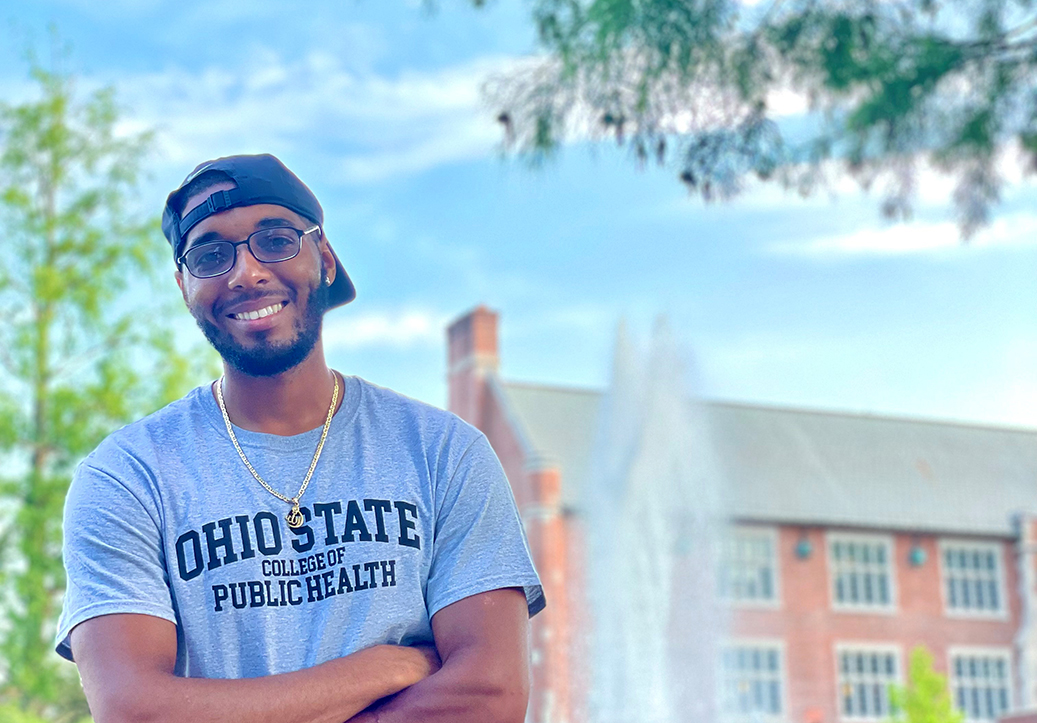Public Health Buckeyes: Lamuel Bean
PhD student, Gates Scholar strives for excellence in education, research

Lamuel Bean, a first-year doctoral student in epidemiology, is a recent graduate of the college’s Master of Public Health program and recipient of the prestigious Gates Millennium Scholarship. Bean is passionate about using epidemiological approaches to reduce the burden of heart disease and its disproportionate effect on Black Americans.
Why did you decide to pursue a PhD in epidemiology?
I intend to take my education as far as I possibly can, as I intend to do with every other facet of my life. Through developing myself to my highest potential, I am building a stronger foundation to uplift others and make an impact on the world.
I’m also highly interested in cardiovascular epidemiology. Cardiovascular disease (CVD) is not only the leading cause of death worldwide, but it’s also the leading cause of death within the Black American community, which has higher incidence of death from CVD compared to all other racial subgroups. Three of my four grandparents died at relatively young ages of heart disease, and the fourth suffered from various heart problems but ultimately died of lung cancer before heart disease could take him. These facts are what initiated my interest in pursuing research in chronic disease.
What’s the importance of your research to public health?
My master’s thesis focused on studying a metabolite common in red meats called Trimethylamine N-oxide (TMAO) and its relationship with increased risk of CVD. In this study, we found a potential new biomarker to assess TMAO serum levels. Hopefully these findings can contribute to better understanding cardiovascular disease risks.
One day — with my advanced skills, education and expertise — I hope to contribute heavily to resolving this chronic disease pandemic.
How has the Gates Millennium Scholarship helped you achieve your goals?
This scholarship and fellowship has blessed me with the opportunity to attend any graduate school within the U.S. for public health covering the full cost of attendance. I was one of the 2% selected among 52,000 applicants throughout the country who qualified to apply.
Receiving this scholarship is one of my most prideful accomplishments and was another big factor in my decision to continue pursuing higher education and a PhD. It contributed to my inspiration to go to pursue public health epidemiology as a career. The motto for the Gates Millennium Scholarship is “Creating future leaders of America.” I wish to live up to what it means to be a Gates Scholar by fulfilling my greatest potential and becoming an impactful leader and influencer through my career in public health, my story and all the skills I’ve worked so hard to craft and develop throughout my life.
What’s something you wish more people knew about epidemiology or public health?
Many of the contributions to prevent epidemics, pandemics and health disparities are done in the background, not the front lines. As public health professionals, if we are doing a good job, most people will never know about it. The nature of the job is to predict and prevent, which means if we are successful, it will never become a significant enough problem for people to be aware of in the first place.
What advice would you give incoming students?
Be humble, be patient, be prudent and be consistent. There is a big learning curve for graduate school compared to undergraduate, specifically in how you are thinking versus what you are thinking. Therefore, be humble and patient with the process to ensure you are well prepared and don’t underestimate the challenges that will come. Be proactive in thinking about what your next steps will be and how you will accomplish them and continually reassess your plan accordingly. Finally, be consistent in making small progress toward your goals or interests every day.
How do you see your education shaping your future?
My public health education has given me a totally new perspective. Public health emphasizes seeing the bigger picture and planning ahead rather than just focusing on the things right in front of you. This paradigm is a perfect example of how to plan for anything you may want to achieve in life.
About The Ohio State University College of Public Health
The Ohio State University College of Public Health is a leader in educating students, creating new knowledge through research, and improving the livelihoods and well-being of people in Ohio and beyond. The College's divisions include biostatistics, environmental health sciences, epidemiology, health behavior and health promotion, and health services management and policy. It is ranked 22nd among all colleges and programs of public health in the nation, and first in Ohio, by U.S. News and World Report. Its specialty programs are also considered among the best in the country. The MHA program is ranked 5th and the health policy and management specialty is ranked 21st.